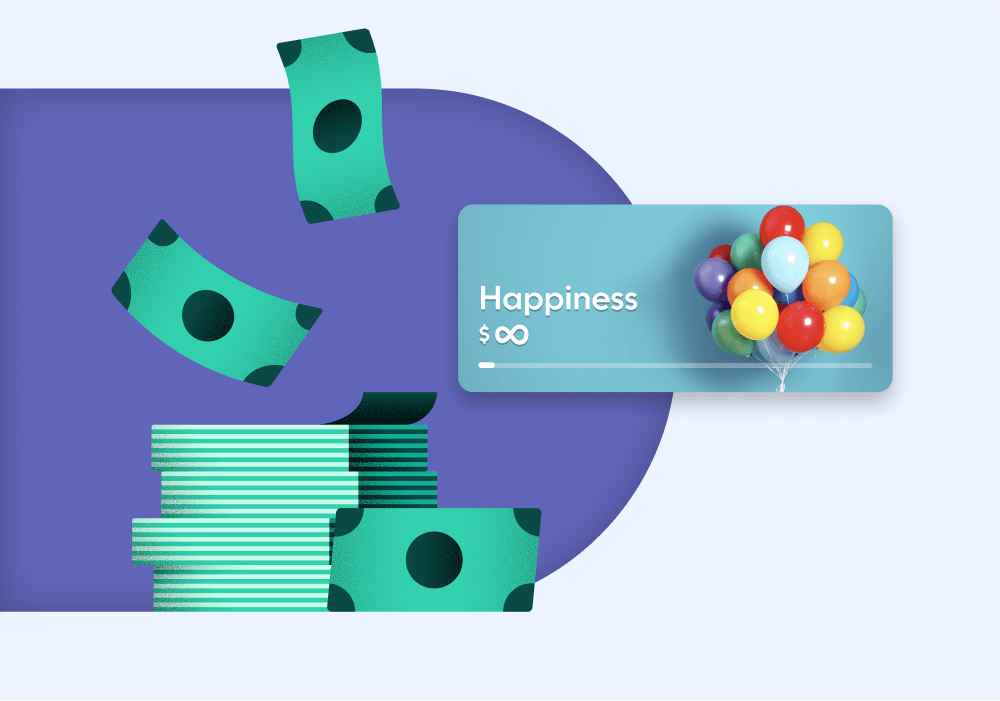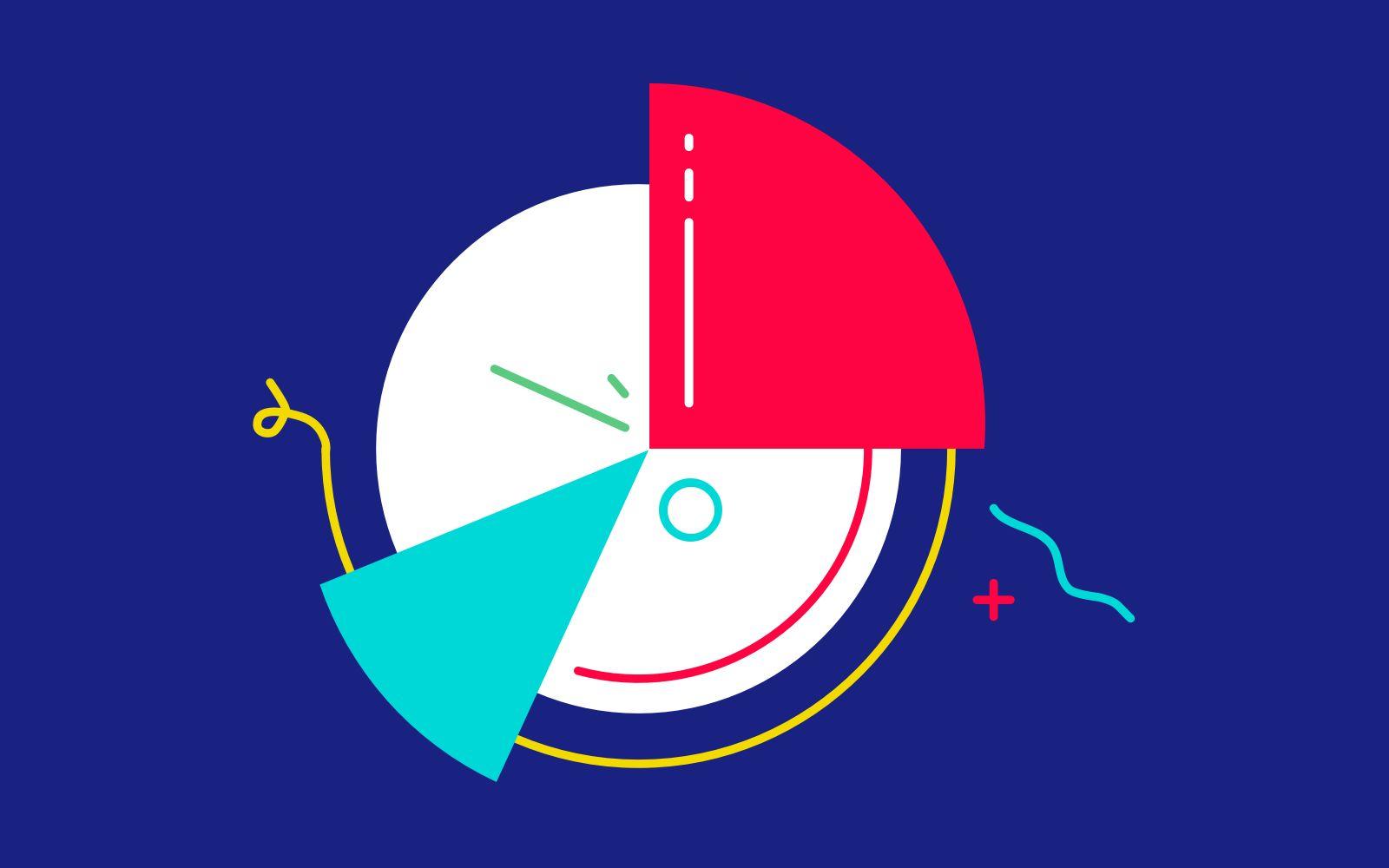It’s an age-old question that never seems to get resolved: can money really buy happiness? We’ll give you a fast rundown of the most important things we know about the relationship between dollars and delight.
What is happiness, anyway?
Even the Greek philosophers disagreed on the definition of happiness; Aristotle believed that happiness was achieved by living a life of virtue and achievement, while Epicurus thought the key to happiness was a life free of pain and fear.
Today, most scientists measure happiness as the satisfaction and positivity we feel in our daily lives. So, what does the existing research tell us about happiness and money?
Having money isn’t everything – not having it, is
More money does correlate with greater self-reported happiness – up to a point.
In a landmark study conducted by Nobel laureate Angus Deaton, people with higher income generally reported greater life satisfaction. However, once the participants made more than a certain amount ($75,000 back in 2010), the relationship fell away. Making more money didn’t make people happier.
Why? Under the $75,000 threshold, people usually spent their money solving problems and making life easier. Couples could eat out at restaurants, parents could afford childcare, and families could afford to buy cars rather than take public transport. The money was spent on reducing pain and inconvenience – a win for Epicurus.
But once participants hit the magic $75,000 threshold, a new effect set in. Psychologists call this problem the “hedonic treadmill,” a formal term for “Keeping Up With the Joneses” syndrome. The theory says that desire is like a treadmill. When we run on a treadmill, we can run faster and faster – but the belt keeps moving faster with us, and in real terms we actually stay in the same place. When it comes to happiness, money is like the speedometer and our desires are like the belt on the treadmill: we can spend more and more, but we’re not getting any closer to true happiness.
Managing expectations
The real problem at the root of the hedonic treadmill is one of expectations: when we have more, we expect more, so it requires more to feel the same amount of happiness.
Arthur Brooks, a Harvard professor and happiness journalist, has broken down satisfaction into an easy-to-understand equation: happiness equals what we have divided by what we want. When we want more than we have, we feel less happy.
Wanting more makes you human, but being human could make you sad. According to Brooks, “all of our evolutionary and biological imperatives focus us on increasing the numerator—our haves.” The problem? High levels of “Keeping Up With The Joneses” syndrome are associated with anxiety and depression.
Brooks again: “But the more significant action is in the denominator—our wants.” Keeping our wants down is a sure-fire way to keep control of the main factor of our happiness. Having lower expectations is one of the secrets that make the Danes consistently at the top of world happiness rankings. ¹
Where pleasure and purpose collide
One other reason that high incomes didn’t make people happier is that money can’t buy some of the key components of happiness.
Paul Dolan, a happiness researcher at the London School of Economics and a collaborator of Nobel laureate Daniel Kahneman, has a new theory of happiness that helps us to broaden our sense of happiness. His pleasure-purpose principle says that there are two main components of happiness: pleasure and purpose. Pleasure refers to the nice sensations that we feel from enjoyable things like relaxing, socializing, vacationing, or sense-seeking – the kinds of things that feel good but might lead us down the endless path of the hedonic treadmill. Purpose is the feeling we get from contributing toward something meaningful in our lives. Something purposeful, like going above and beyond at work or visiting an ailing family member, might not always be pleasurable, and vice versa.
The problem, according to Dolan, is that we sometimes get our pleasure-purpose balance out of whack. Have you ever binged on Netflix for hours on end and felt empty afterwards? You’ve probably overdosed on pleasure. Felt glad, but emotionally drained after supporting a friend through a months-long saga of illness or grief? You’ve probably hit your purpose quota and need some pleasure. The key is finding an equilibrium between the two in our daily lives.
Back to the magic $75,000 threshold. Above the threshold, participants seem to have a pleasure surplus and a purpose deficit – a win for Aristotle’s theory. The trouble is that buying purposeful things is rarer and harder to do.
Beating Father Time: buying experiences and time savings
So how can we put our money to better use and avoid the hedonic treadmill?
Research has shown that, in most cases, experiences lead to longer-term happiness than possessions.² The pleasure that we receive from possessions typically fades, especially when it’s something we see every day, whereas we keep the memories from an experience and can relive them multiple times. Plus, if we have experiences with friends and loved ones, then we also solidify the life-affirming bonds that are scientifically proven to help us live longer and healthier lives, too.³
Philosophers often tell us that time is our only real resource, and in everyday speech we often use the expression “buying time” to mean stalling – but what if you could actually buy time, as if it were a commodity like water or food? Well, we can’t purchase years to tack onto the end of our lives (yet), but money we spend to avoid using up our own time can tangibly boost happiness, according to studies by Michael Norton and Dr. Elizabeth Dunn.⁴ A few dollars on grocery delivery can save time and hassle; paying a house cleaner can give you back hours of leisure time; taking a taxi from the airport might cut out hours on trains and buses. It can be counterintuitive at first to think about spending money on intangible things, but it’s the quality of our experiences, fleeting as they are, that stick with us the most.
Being purposeful - and generous
Want to be the happiest of all? Well, there’s research that the best thing you can do for your own happiness might be giving your money away.
In a Swiss psychological study, participants who were asked to spend money on someone else were significantly happier than those who were asked to spend the same amount of money on themselves. Even better – the amount of money they were asked to spend on someone else didn’t really affect how much of a happiness boost they got.
Generosity is associated with mood-boosting and stress-relieving power that’s associated with living longer, too. New research by Happy Money proves that people who donate to charities are happier across all demographics – the kind of quantifiable uplift that we rarely see from things outside of exercising and socializing.⁵ If you’re looking for a real happiness kick, then consider donating to charity, bringing your colleagues coffee in the morning, or buying a surprise gift for a close friend.
While money can’t buy us happiness in a bottle, the way that we spend our money can certainly have a huge impact on the way that we feel. Let Qapital help you buy your happiness.
Qapital, LLC is not a bank; banking services provided by Lincoln Savings Bank, Member FDIC, and other partner banks. Advisory services provided by Qapital Invest, LLC, an SEC-registered investment advisor. The information provided herein is for informational and general educational purposes only and is not investment or financial advice. Copyright © 2022 Qapital, LLC - All rights reserved.
[1] Carey, Benedict. “Denmark's Secret to Happiness: Low Expectations - Europe - International Herald Tribune.” The New York Times, The New York Times, 8 Jan. 2007
[2] Landau, Elizabeth. “Study: Experiences Make Us Happier than Possessions.” CNN, Cable News Network
[3] Hopper, Elizabeth. “How Your Social Life Might Help You Live Longer.” Greater Good, 28 July 2020
[4] Rae, David. “The Five Principles of Happy Money.” Forbes, Forbes Magazine, 29 June 2021
[5] Money, Happy. “New Study from Happy Money Reveals People Who Spend Money on Others and Make Time-Saving Purchases Are Happier.” New Study from Happy Money Reveals People Who Spend Money on Others and Make Time-Saving Purchases Are Happier, 7 July 2022
Share


